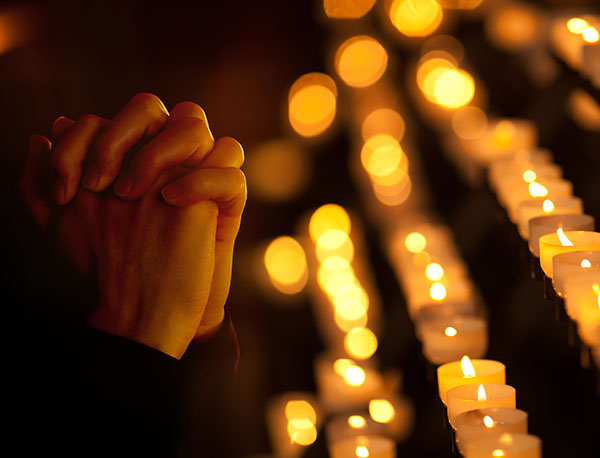(July 28, 2019) Lectionary: 111
Adults: Have your most recent prayers been prayers of praise, petition, or sorrow? Which kind of prayer do you need to practice more often?
Children: What are you most thankful for right now?
by Thomas Gette
 Imagine going into work each day and never saying hello to any coworkers. Lunch is met with an awkward silence and no conversation. As the day continues, everyone attempts to do their projects without communicating. Finally, the day concludes, and everyone departs without a single word.
Imagine going into work each day and never saying hello to any coworkers. Lunch is met with an awkward silence and no conversation. As the day continues, everyone attempts to do their projects without communicating. Finally, the day concludes, and everyone departs without a single word.
Aside from the obvious fact that it would be virtually impossible to get any work done without communication, it would make for a strange and awkward workday to just sit alongside people and have no interaction. There would be no friendship, no relationship, no planning, and no productivity.
This is true of any environment, whether it be a home, a school, or a sports team, but it is especially true when it comes to our relationship with God.
When we start our days without prayer and do not welcome God into our plans and ideas, our relationship with God becomes awkward, the way it would for the people in the silent office environment. Sure, the day will still go by, but it will become very obvious that something is missing and everything is affected by the absence.
In the busy-ness of life, it is easy for prayer to take a backseat. It is easy to think about the million things that need to be done and for our focus to be exclusively on them. That generally sets the tone for the day, and before we know it, we have gone through the day without much thought to prayer and centering our thoughts and decisions in God.
When I fall into this rut, I sometimes joke that my prayer life has been reduced to just randomly blurting things out at God. My prayer life becomes reactionary. Then my prayers are usually “Why?” or “Help!” or “I can’t stand this, Lord” or “This is frustrating.” But things get that way because I did not invite a healthy rhythm into my day in the first place. Prayer and God become afterthoughts instead of the strength that gets me through my day.
 We all have a certain prayer type that we need to improve upon and, then, practice more often. Stereotypically, most of us remain in a cycle of petition prayer. We’re always just asking things of God as if he is a vending machine. We can bring greater meaning to our prayers of praise or sorrow when they are part of an ongoing conversation we already have with God.
We all have a certain prayer type that we need to improve upon and, then, practice more often. Stereotypically, most of us remain in a cycle of petition prayer. We’re always just asking things of God as if he is a vending machine. We can bring greater meaning to our prayers of praise or sorrow when they are part of an ongoing conversation we already have with God.
Prayer takes on a new meaning when we learn to just talk and listen to God about all aspects of our lives. Doing so will bring greater meaning to our days. God won’t seem like such a stranger when we go to him not only with our petitions, but with our doubts, our fears, our joys and our gratitude, as well.
Thomas Gette is a family man with a passion for the domestic Church. He holds master’s degrees from both Franciscan University and the Catholic University in Leuven, Belgium. When I have time to watch TV, one of my favorite shows is a particular home remodeling show. The hosts help clients decide on a home which will then be remodeled from frumpy to fabulous. One of the hosts routinely asks the question, “Are you ready to take on a fixer-upper?”
When I have time to watch TV, one of my favorite shows is a particular home remodeling show. The hosts help clients decide on a home which will then be remodeled from frumpy to fabulous. One of the hosts routinely asks the question, “Are you ready to take on a fixer-upper?”
I’ve heard her say it a hundred times, but today, when she said it, I heard her challenge in terms of taking on a person, not a house, who needed some tender loving care, and, perhaps, a demo day. While it is often said you can’t fix people, we can certainly help them try to fix themselves.
I was reminded that fixer-uppers were Jesus’ specialty.
Jesus was known as a friend to sinners, a derisive term he earned from his opponents. But he was fine with it, because it was true. Jesus came to seek and save the sinner, knowing that most often behind the sin is a wound.
I have written it before and I will write it again. Woundedness is a condition that affects the heart and health of both personal and community life.
Wounded people run our schools and parish ministries, sit in our classrooms, stand on the altar, celebrate the Sacraments and answer the office phones. People who grieve the death of a loved one, the failure of a marriage or the loss of a job fill the pews every Sunday.
Our children come to school and religious education programs struggling with the pain of broken families and broken systems, often falsely believing they are somehow responsible for it all. These children grow up into broken adults.
But Jesus sees in them what he saw in Zacchaeus, the notorious tax collector; the Samaritan woman at the well; the woman caught in adultery; the sinful woman who came to anoint Jesus with expensive oils and wipe his feet with her hair.
Jesus shared many meals with those who needed companionship and a new perspective; he healed those who were sick, in body and mind; he forgave those who were repentant of their bad decisions, often very bad decisions, pointing out that those who are forgiven much, love much.
We may not be able to heal the stick or raise the dead, but we can make a difference by following Jesus’ example in one powerful practice – being present.
Writing in his book ,The Gift of Peace, completed during the last few months of his life, Cardinal Joseph Bernardin, Archbishop of Chicago, reflected, “Somehow, when you make . . . eye contact, when you convince people that you really care and that, even if hundreds of others are around, at that particular moment they are the only ones that count – then you establish a new relationship. . . . They sense that somehow you truly care about them and that, more importantly, you have somehow mediated the love, mercy and compassion of the Lord.”
And that is how you take on a fixer-upper.
Mary Regina Morrell is a Catholic journalist, author, and syndicated columnist who has served the dioceses of Metuchen and Trenton, New Jersey, and RENEW International in the areas of catechesis and communication.It is not surprising that my sons are animal lovers, considering I am their mother, and that our house was always full of animals we adopted or were caring for in some capacity. Orphaned rabbits and baby possums, birds of all varieties, and a stream of escapees from the nearby animal shelter all became members of our family at some point in time.
It is also not surprising that my sons married women who also love animals. One son and his wife first fostered a Great Dane when they were living in a small apartment with a feisty miniature schnauzer and two ferrets. After they moved into a new house with a large backyard, pony-sized Pluto quickly took a paternal interest in the two bunnies who were soon added to the family.
 Over time, they took in other cats and dogs, including a young Great Dane, Remmy, just hours from being euthanized, with plans to return her to health and put her up for adoption through a rescue organization.
Over time, they took in other cats and dogs, including a young Great Dane, Remmy, just hours from being euthanized, with plans to return her to health and put her up for adoption through a rescue organization.
Remmy was weak and emaciated from not eating or being cared for and had trouble walking. This was complicated by not having the use of one of her paws. As a result, she was happy to resign herself to the couch where she was showered with love and affection, plied with good quality food and, eventually learned to play.
Looking back at Remmy’s photos, I am reminded of the dogs in Scripture who scavenged for scraps under the table, dropped by the children who were fed first, and best. Fortunately for Remmy, she became one of the fur babies at the table and thrived under the care of my son and his wife, and their children, who have learned that real love always provides more than scraps.
With their care, she eventually found her forever home with a family that loved her.
Sadly, there are an extraordinary number of our sisters and brothers who continue to get only what falls under the table. They scavenge not only for food, but for compassion and recognition of their value as human beings. Saint Teresa of Calcutta learned through her own work with the poor and marginalized that “the most terrible poverty is loneliness, and the feeling of being unloved.”
Her words are a continual challenge to me, and I find myself reflecting on my own failure to do what I consider something significant to bring them to the table. Can I do any better at being the hands and feet of Christ on Earth?
Thankfully, I also have the saint’s words of encouragement: “Not all of us can do great things. But we can do small things with great love.”
I remind myself that I am capable of doing small things with great love, but just to make sure I don’t forget my goal, I have included Saint Teresa’s wisdom in my daily reflection: “I am not sure exactly what heaven will be like, but I know that when we die and it comes time for God to judge us, he will not ask, 'How many good things have you done in your life?' Rather he will ask, 'How much love did you put into what you did?’”
Mary Regina Morrell is a Catholic journalist, author, and syndicated columnist who has served the dioceses of Metuchen and Trenton, New Jersey, and RENEW International in the areas of catechesis and communication.(July 28, 2019) Lectionary: 111
Gospel: Luke 11: 1-13
Have your most recent prayers been prayers of praise, petition, or sorrow? Which kind of prayer do you need to practice more often?
ACTS
Adoration
Each day provides opportunities to adore the Holy Trinity. Who can help but adore the Creator when standing on the ocean’s shore, watching sea life at play? Lately, I’ve been thinking much about the enormous gift of Jesus’ Death on the Cross, and I simply adore Jesus as Savior and Lord. When ideas for an article or presentation come to mind, I stop and adore the Holy Spirit, my source of inspiration. These simple prayers of adoration help me remain mindful of the greatness of God in the world around me and in my own life.
Contrition
As I continue my journey of faith, I realize more and more my own need for forgiveness, understanding, and compassion. Over time, this realization has enabled me to pray that God would love and bless those who have most deeply hurt me. Knowing that I cannot undo the past, and mindful of my sins and failings in the present, I turn to God and pray, “Jesus, Son of the living God, have mercy on me, a sinner.”
Thanksgiving
Many years ago, while leading a Lent retreat, I invited participants to adapt a practice long-held by our Jewish sisters and brothers—that of praising and thanking God 100 times throughout the day. For example, when waking up in the morning, thank God for the gift of a new day. When brushing your teeth, thank God for the gift of water. When dressing for the day, thank God for the gift of clothing. On a subsequent visit to the parish, a man who had attended the Lent retreat shared with me that he made the 100 daily prayers his Lenten discipline, and his life was changed because of that practice. I use this practice as a helpful reminder that no matter what I am going through, there is always much for which to be thankful.
Supplication
These days, I find myself praying many prayers of supplication. In conversation with friends and with strangers, I am often asked to pray for a person or a situation. And when I say, “I’ll pray for you,” I mean it! That is why I keep a prayer list near the spot where I most often sit to pray. There are prayers that always remain on the list—for family members, for protection, and for wisdom in my work—and there are prayer requests that are for a short time or a specific situation. Having recently read a wonderful devotional book on Our Lady of Guadalupe, I also ask Our Lady to wrap in her beautiful cloak and her loving embrace the people for whom I am praying.
ACTS: Adoration, Contrition, Thanksgiving, Supplication.
This simple acronym is a wonderful invitation to keep our prayer lives in balance. Which kind of prayer do you need to practice more often?
Mary Sellars Malloy has over forty years’ experience as a Catholic educator and lay minister. She is a frequent workshop presenter on the topics of prayer, liturgy, spirituality, the Sacraments, and the RCIA. In addition, Mary leads retreats and parish missions throughout the country. Her goal is to encourage Catholics of all ages to appreciate and to live their Catholic faith. Years ago, before Superstorm Sandy hit the Jersey coast and changed life for so many people, including me, I often visited a small café on the ocean where breakfast was served on a dock overlooking the water.
Years ago, before Superstorm Sandy hit the Jersey coast and changed life for so many people, including me, I often visited a small café on the ocean where breakfast was served on a dock overlooking the water.
I found it a wonderful place to decompress and absorb the restorative energy of the ocean. It was enchanting, but when dolphins sometimes showed up, it wasn’t just me who was enchanted.
In an instant, children would run from their chairs to the deck’s edge, breakfast chatter quieted, forks went down and attentions were strained for a better look at these amazing creatures.
What is it about these spirits of the ocean that captures the heart and imagination? Why are so many compelled to stop their ceaseless running through time even for a few seconds just to get a glimpse of these free and powerful mammals?
Perhaps they are a déjà vu for the human spirit, calling to our sacred nature, our sense of what was and what could be if we were to nurture our hearts and souls as much as we do our minds and bodies. Dolphins are at home in the primordial waters of creation. Mystics of the sea. Perhaps they are what each of us has the capacity to be – one with creation, one with God.
I sense that Pope Saint John Paul II, who spoke often of the sacredness of nature, would have enjoyed this place. It was he who wrote that “nature becomes a Gospel that speaks to us of God: 'For from the greatness and beauty of created things comes a corresponding perception of their Creator'” (Wisdom 13:5).
He reminded us of Paul’s teaching that, “‘Ever since the creation of the world [God's] eternal power and divine nature, invisible though they are, have been understood and seen through the things he has made' (Romans 1:20). But this capacity for contemplation and knowledge, this discovery of a transcendent presence in creation, must also lead us to rediscover our fraternity with the earth, to which we have been linked since creation” (cf Genesis 2:7).
Eventually, as unexpectedly as they came, the dolphins would slip out of sight, guests would return to their seats and the animated chatter returned to the breakfasting crowd. Though attentions turned back to the business of the day, it was encouraging to believe that those few minutes of dolphin-watching made an impression on some receptive soul who would be inspired to “rediscover their fraternity with the earth,” and lead others to do the same.
We are, after all, called to be stewards of creation.
Mary Regina Morrell is a Catholic journalist, author, and syndicated columnist who has served the dioceses of Metuchen and Trenton, New Jersey, and RENEW International in the areas of catechesis and communication.
(July 21, 2019) Lectionary: 108
Gospel: Luke 10: 38-42
Which response to God’s call is more natural to you—prayer or action? Why?
Ora et labora—pray and work.
 This motto of St. Benedict is reflected in the typical daily schedule of a monastic community, which includes time for prayer and silence and time for work and community life.
This motto of St. Benedict is reflected in the typical daily schedule of a monastic community, which includes time for prayer and silence and time for work and community life.
Many of us who are raising families, running households, and working outside of the home do not have the luxury of adhering to a monastic schedule. Our time is spent in the car, on the run, making sure the homework is done, the dog is walked, the family is fed, and the lawn is mowed before the storm moves in. And yet Ora et labora invites us to pause and consider how we are spending the gift of time.
This Sunday’s Gospel reading makes me smile. I did not know it at the time, but my husband and I were married on the Feast of Saint Martha—July 29. The story of Martha and Mary is, in many ways, a reflection of our personalities. I am more the doer, prone to jump into action when the need arises. I think my “doing” tendencies go back to my parents’ example of always looking for ways to serve a neighbor, blessing someone who was going through tough times, making room at the table for family and friends, and being active members of their parish family. They mentored us into this way of life too. We look at the world, near and far, with eyes that recognize our neighbors’ needs, ears that hear the stories they share, and hands that are not afraid to work and serve.
But as I reflect on the Gospel, and on the question, I realize that my parents also raised us to take time to pray. My mother was the parish music minister, so we were naturally often at church, but beyond that, we did pray for neighbors, family members, the sick, victims of natural disasters, and others who asked for our prayers. My grandmother taught us by her example to let the news of the day guide us in praying for the world. To this day, my husband and I will watch the morning news and pray for those who are impacted by violence and natural disaster.
Over the years I’ve been more mindful of bringing prayer and work together throughout the day. As I fold laundry, I pray for my husband and for his day. As I prepare a meal for friends, I pray that our gathering will bring healing and joy to those who join us at the table. And as I begin a new project, I ask the Holy Spirit to inspire and guide me so that my work serves the needs of those who have invited me to write or present.
Ora et labora—pray and work.
In the week to come, think about Martha and Mary and how you are spending the precious gift of time.
Mary Sellars Malloy has over forty years’ experience as a Catholic educator and lay minister. She is a frequent workshop presenter on the topics of prayer, liturgy, spirituality, the Sacraments, and the RCIA. In addition, Mary leads retreats and parish missions throughout the country. Her goal is to encourage Catholics of all ages to appreciate and to live their Catholic faith. After a recent visit to a friend’s house where her brood of four were regularly engaging in arguing, pushing and shoving and fighting over toys, their mom said to me, “I would give anything for some peace!”
After a recent visit to a friend’s house where her brood of four were regularly engaging in arguing, pushing and shoving and fighting over toys, their mom said to me, “I would give anything for some peace!”
The constant conflict among her children, which as parents we know is inevitable to some degree, was robbing her whole family of peace of mind, body and spirit.
What I have come to understand over the years is that peace needs to be cultivated on many levels, but it begins with us having clarity on what we believe about peace.
For us, as children of God, it must be something more than simply the absence of war. It must flow from our relationships – with God, with creation, with others, and with ourselves.
Years ago, during an annual conference for Catholic school teachers and catechists, I gave a workshop entitled, “Is Peace the Piece That is Missing?”
 During the presentation I offered a few questions for reflection: How many of you have spoken about peace to your students in the last week; given a homework assignment relating to peace; offered prayers for peace with your class; undertaken some action for peace with your class; have a peace bulletin board; have the word peace visible somewhere in your classroom?
During the presentation I offered a few questions for reflection: How many of you have spoken about peace to your students in the last week; given a homework assignment relating to peace; offered prayers for peace with your class; undertaken some action for peace with your class; have a peace bulletin board; have the word peace visible somewhere in your classroom?
The most provocative question, apparently, was, “How many of you know, without a doubt, where you stand on the issue of peace and the need for war?”
The answers were not encouraging. One teacher walked out. She had lost a brother in the Twin Towers attack and was very angry with me and with what I was sharing with them regarding the way of peace.
Then, two years later, a woman stopped me in the hall at the same annual conference and asked if I had given a workshop on peace there a few years prior. When I acknowledged that I had, she said, “I am the woman who walked out. It took me a long time, more than a year, but I finally got it.” Then she hugged me.
Dorothy Day once said, “The greatest challenge of the day is: how to bring about a revolution of the heart, a revolution which has to start with each one of us.”
That is what Jesus did.
That is what we are called to do—to bring about a revolution, first in our own hearts, and then in the hearts of others, but for many, that challenge is among the most difficult they will ever face, because it requires a deep assessment of the intentions of their own hearts. Sometimes that’s a frightening thing.
Peace, said Pope Francis, “is a gift and a task.” Speaking about St. Francis of Assisi, whose great love of God, creation and others led him to be a true peacemaker, the Holy Father reminds us, “Each of us is called to follow in his footsteps by becoming a peacemaker, an ‘artisan’ of peace.”
With the help of God, we are up to the task.
Mary Regina Morrell is a Catholic journalist, author, and syndicated columnist who has served the dioceses of Metuchen and Trenton, New Jersey, and RENEW International in the areas of catechesis and communication.(June 16, 2019) | Lectionary: 166
Adults: In what difficult situation has the Holy Spirit helped you see more clearly?
Children: What kind of decision can the Holy Spirit help you with?
by Thomas Gette
In the hurried nature of our culture, it is easy to get stuck in the momentum of doing and achieving. Usually our days are a sprint from our beds in the morning back to our beds at night. Even if we have excellent time management skills, our days can make us feel like we’ve been shot out of a canon.
The fast pace of our days has us focused on quickly moving on to the next thing. The defining characteristic in this daily race is a lack of rhythm.
Imagine if music was composed in this way: all the instruments playing in fast tempo, accelerating until a full stop. It would not be enjoyable to the listener. What makes music so effective and beautiful is the balance between silence and sound. We get drawn in by this dance of melody and harmony and rhythm. Classical music especially is known for its moments of “grand pause.” Such moments give dramatic effect and a bit of rest.
Similarly, when our lives speed along, it becomes very difficult to listen to the voice of God. The Holy Spirit is always trying to guide us and speak to us. But if we do not give ourselves moments to listen, we can easily miss out.
This is especially true when we are facing difficult moments. Taking time to pause and listen and seek guidance from the Holy Spirit can open our eyes to see clearly in times of trial and stress. It is often said that decisions should not be made under stress. We can be at peace knowing we have a sure guide to help us navigate.
Even if we are not facing a particularly difficult situation, finding a way to create a rhythm to our days will bring about much more peace and clarity. Punctuating our days with prayer and silence can help us stay connected with God and can help us keep from feeling suffocated and drained from overwork and overcommitment. Then, when we face a difficult situation, we will have the strength and clarity to act with grace and peace.
Thomas Gette is a family man with a passion for the domestic Church. He holds master’s degrees from both Franciscan University and the Catholic University in Leuven, Belgium.(June 23, 2019) | Lectionary: 169
Adults: When have you been most blessed and when have you felt a little “broken” in your service to others?
Children: Why is it important to keep on giving, even when you are tired?
by Thomas Gette
Athletes who train live a life dedicated to their sport. They put in multiple hours every day of heart-pounding, body-disciplining exercise. Obviously, there are days when they are on top of the world and the hours of training are euphoric. Then there are the days they feel sick or feel like giving up.
What keeps them motivated is not the training itself. Their focus and determination come from having their eyes focused on a single thing. They put in all the countless hours and days of work for a single moment, with the hope that they will come out on top as the winner of the event for which they have trained.
The effort and dedication do not go unnoticed. Fans flock by the millions every year to various sporting events in order to witness the fruit of all the training. They get to witness what seem like superhuman abilities. But behind all of that is the result of saying “Yes” every day and pushing through pain and weakness.
Our faith can be much like this. Living our faith requires daily practice, a daily “Yes” to God. Of course, we will have days where it feels easy to live out our “Yes” because we are experiencing extra blessings, but then there will be days when we feel a little more “broken” and honoring our “Yes” is much more difficult. Much like the athlete, pushing through requires that we stay focused on what our faith is all about.
In 1 Corinthians 9:25, Saint Paul tells us: “Every athlete exercises discipline in every way. They do it to win a perishable crown, but we an imperishable one.” We live out our faith on the journey towards the Kingdom of God, towards the reward of Heaven. This is not to say that athletes work in vain. Faith simply reminds us that we should have our eyes set beyond this world.
On this Solemnity of the Most Holy Body and Blood of Christ, we celebrate the greatest gift we have on Earth, the Holy Eucharist. Through this precious gift, Jesus remains present among us. When all is going well, we can bring our eyes to Jesus. When all is falling apart around us, we can bring our eyes to Jesus. It is then in receiving Jesus in Holy Communion at Mass that we receive the strength to endure the hills and valleys of our everyday lives.
For the athlete, winning the competition is both the motivator for and the goal of training. For disciples, Jesus is the reason we live in service to others, and our goal in service is to be his presence in the world today. Jesus is the path we walk, but also our destination. We strive to live for Christ in this world so that we can one day be with Christ forever in Heaven.
Thomas Gette is a family man with a passion for the domestic Church. He holds master’s degrees from both Franciscan University and the Catholic University in Leuven, Belgium.(May 30 or June 2, 2019) | Lectionary: 58
Adults: Who in your family has the gift of wisdom? How does he or she use this gift?
Children: Who is the wisest person you know? What has he or she taught you?
by Thomas Gette
When we reflect on our families, it is likely easy to identify those people who have the gift of wisdom. It may be a parent, grandparent, aunt or uncle, godparent, or guardian. We may find that, when difficult choices need to be made, our wisdom person is the one we most often go to for help.
We may often think of someone as wise simply because they offer good advice. But that is only a part of it. A truly wise person lives a life of integrity. Their faith is integrated into all they do, and wisdom holds everything in balance.
Actually, wisdom is one of the seven Gifts of the Holy Spirit. We may remember having to memorize the list as we prepared for our Confirmation: wisdom, understanding, counsel, fortitude, knowledge, piety, and fear of the Lord.
Wisdom can be a misunderstood virtue. It is often confused with knowledge and understanding. Wisdom is our guide in the proper living of the other gifts. Wisdom helps us make the proper choices and discernment based on all we know, believe, and do.
We all certainly know someone in our lives who embodies wisdom, but that wisdom is not always an easy thing to describe. We see it in in how they live their lives and how they encourage us to live ours. They understand the value of listening – to us and to God – and turning things over to God in prayer. A person of wisdom is a disciple of Christ.
Wisdom is not really something we can teach. It is something that comes from encountering the Lord. Pope St. Paul VI once offered a powerful thought on the impact of the wise disciple: “Modern man listens more willingly to witnesses than to teachers, and if he does listen to teachers, it is because they are witnesses.”
In his 2014 catechesis on wisdom as a Gift of the Holy Spirit, Pope Francis said, ”We must ask the Lord to grant us the Holy Spirit and to grant us the gift of wisdom, that wisdom of God that teaches us to see with God’s eyes, to feel with God’s heart, to speak with God’s words. And so, with this wisdom, let us go forward, let us build our family, let us build the Church, and we will all be sanctified. Today let us ask for this grace of wisdom. And let us ask Our Lady, who is the Seat of Wisdom, for this gift: may she give us this grace.”
Thomas Gette is a family man with a passion for the domestic Church. He holds master’s degrees from both Franciscan University and the Catholic University in Leuven, Belgium.Pagination
Latest
Categories
Archives
- February 2015 (2)
- March 2015 (2)
- April 2015 (5)
- May 2015 (3)
- June 2015 (6)
- July 2015 (3)
- August 2015 (5)
- September 2015 (5)
- October 2015 (4)
- November 2015 (2)
- December 2015 (1)
- February 2016 (2)
- March 2016 (1)
- April 2016 (2)
- May 2016 (2)
- July 2016 (2)
- August 2016 (2)
- September 2016 (1)
- October 2016 (5)
- November 2016 (1)
- December 2016 (3)
- January 2017 (2)
- February 2017 (3)
- March 2017 (2)
- April 2017 (1)
- June 2017 (2)
- July 2017 (2)
- August 2017 (1)
- April 2018 (1)
- October 2018 (2)
- December 2018 (2)
- February 2019 (3)
- March 2019 (2)
- April 2019 (2)
- May 2019 (3)
- June 2019 (1)
- July 2019 (16)
- August 2019 (8)
- March 2020 (4)
- April 2020 (6)
- May 2020 (8)
- June 2020 (7)
- July 2020 (5)
- August 2020 (7)
- September 2020 (4)
- October 2020 (5)
- November 2020 (9)
- December 2020 (11)
- January 2021 (10)
- February 2021 (8)
- March 2021 (5)
- April 2021 (4)
- May 2021 (4)
- June 2021 (5)
- July 2021 (2)
- August 2021 (3)
- September 2021 (4)
- October 2021 (4)
- November 2021 (2)
- December 2021 (5)
- January 2022 (4)
- February 2022 (4)
- March 2022 (9)
- April 2022 (7)
- May 2022 (9)
- June 2022 (12)
- July 2022 (7)
- August 2022 (10)
- September 2022 (9)
- October 2022 (11)
- November 2022 (8)
- December 2022 (7)
- January 2023 (2)
- February 2023 (10)
- March 2023 (9)
- April 2023 (10)
- May 2023 (8)
- June 2023 (4)
- July 2023 (3)
- August 2023 (2)
